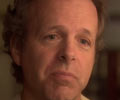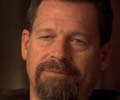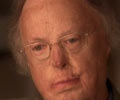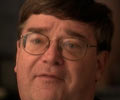- People
- Mark McKinnon
- Mark Salter
- Robert Timberg
- Charlie Cook
- Victoria Clarke
- Related Links
- A Son's Measure of His Father
Newsweek's Jon Meacham interviews Sen. McCain. - The Lonesome Trail
A New Yorker profile of Cindy McCain
Mark McKinnon Media adviser, McCain campaign, 2007-'08; media adviser, Bush re-election campaign

I think it all grows out of his DNA. It's not just his father and his grandfather. It goes back to -- I mean, his relatives served with George Washington. There's a code of honor, a code of conduct, ethics, morality, courage. He's thought a lot about big issues like that. And I think that makes him who he is. He feels like he has to live up to that family history.
Mark Salter Senior adviser to John McCain
 Read the full interview >
Read the full interview >
I had somehow come across an oral-history interview that John's father had given the Naval Institute, where he described that last meeting with his grandfather. And he said, "My father had told me that it's an honor to die for your country and your principles, and that's something I've remembered down through the years." That was his father talking about his grandfather.
I think that ethic is either genetically or environmentally imprinted in the McCain family. There are all sorts of hugely colorful characters in that family. His great uncle, who they called Wild Bill McCain and retired, I think, as a brigadier general in the Army and attended West Point -- the last McCain to go to West Point -- had fought with Gen. [John] Pershing and fought Pancho Villa. They called him Wild Bill for a reason: He rode his horse up into his future father-in-law's front porch and asked for the hand of his daughter.
They were just colorful, big, outsized personalities, but all of them devoted essentially to self-sacrifice; that whatever we are, whatever our colorful ways, we serve something bigger. There's been a McCain in uniform since the revolution, or a McCain ancestor. A McCain ancestor served on Gen. Washington's staff.
What does that do to a young boy to grow up in a position like that? ... And what does that young boy carry into manhood?
I think he is aware that he is deprived of some things that other sons aren't: the constant presence of a father. ... He attended many, many schools because they moved all the time, from base to base, and I think that bred in him a certain restlessness. That's why he's always very forward-looking; he never ... exalts in a moment of triumph or despairs in a moment of defeat. He just moves on. I've met very few people with a capacity to do that to the extent that he's able to. ...
His favorite book is For Whom the Bell Tolls, in which the hero is aware he's sacrificing himself for a lost cause. Sort of this beautiful fatalism of that sacrifice, that is an ethic that's been in his family, I assume, for 200-and-some-odd years.
Now on the same hand there was resentment -- he'd be the first to admit to it -- that he was never given a choice about attending the Naval Academy or joining the Navy, ... and that resentment probably showed up when he was quite a challenging midshipman.
How challenging?
Well, he graduated fifth from the bottom of his class, and he managed to accumulate, as he calls it, a very impressive catalog of demerits. But never quite crossed the line. So I think he went through a phase where he not just accepted but understood the sort of nobility of the profession and culture, the calling he had, but worked out whatever resentment or conflicts he had about a lack of autonomy in the matter by being something of a discipline problem. ...
[H]e and his father and his grandfather had very similar records at the Naval Academy. All three earned quite a few demerits for various infractions of the rules. But they were the kind of people who had a very firm honor code; that as long as you didn't cross those bright lines, you were, if not encouraged, not terribly reprimanded for being a little iconoclastic in other ways. ...
The things I think he learned from his father, who had learned from his father, were that as long as you risked everything for something bigger than your own self-interest, and as long as you didn't lie, cheat or steal, you had earned respect. ...
Robert Timberg Author, John McCain: An American Odyssey and The Nightingale's Song

They were all renowned mavericks.
[The] interesting thing about both Adm. McCain the first, the one they call "Slew" and his son, John's father, is they both did really badly at the Naval Academy. Adm. McCain, the grandfather, the Naval Academy yearbook refers to him as the skeleton in the closet of the class of 1906. And his father had serious conduct problems and was actually banished from Bancroft Hall, which is the world's largest dormitory. It's where all midshipmen live. He was banished to this old rust bucket that was moored to the seawall in Annapolis. I actually have never heard of anybody being punished like that. I can't believe he was the only one, but that's relatively heavy.
As far as being mavericks later on, I don't know. My sense is that they were both pretty much Naval officers who pretty much stuck to the Navy line. I think they were exceptionally good at what they did, but I don't think they were mavericks in the Navy. ...
And his relationship with his dad?
I think his relationship with his father was not all that close. It was a relationship of high regard and respect. But he didn't see his father as much as he would have liked. And I don't think they had ... a relationship where there was an easy camaraderie between the two. I don't think they went off and did things together. I don't question for a second that he loved his father or that his father loved him. But it was kind of at a kind of psychological distance.
Interesting thing about this is that, because his father and grandfather were such major figures, people tend to look at Sen. McCain through a prism of his father and grandfather. And yet my belief is that he is as much his mother's son as he is his father's son or his grandfather's grandson.
Roberta McCain is really something else. She's my idea of the unsinkable Molly Brown. I also think that that resilience and unsinkable quality defines Sen. McCain more than any other. ...
Charlie Cook The Cook Political Report

I remember thinking, "What made him stay in the race?" When his candidacy was just dead as a doornail last summer, why would he stay in? It seemed so hopeless. ...
I heard a story that made me think, maybe that's it. And it's the story about his mother, Roberta, you know, 96 years old. Back in 2005, when she was, I guess, 93, she goes to Europe with her twin sister. Apparently they get to Paris, Roberta decides to rent a car and the rental car agency won't rent her one because she's 93 years old. So apparently she bought one. And so 93-year-old Roberta and her twin sister are tooling around Europe in a car she bought cause the rental car agency wouldn't rent her one.
And then when they got finished and ready to head back to the States, she apparently had the car shipped back for a grandson or someone who needed a car. And I'm thinking, first of all, what 93-year-old person's alive? Secondly, is tooling around Europe, is buying a car because they couldn't get a [rental]? I mean, this is not a normal person, and I'm thinking, "Maybe this is where John McCain gets it." Anybody that could spend five-and-a-half years in a cell at the Hanoi Hilton and not come out a raving lunatic, maybe they've got some genetic -- I mean, wow. But this is not a quitter.
Victoria Clarke Former McCain press secretary, 1983-'89

A lot of people spend a lot of time trying to figure out Cindy, and saying well, she seemed very visible sometimes, not so visible other times. She's had her own ups and downs, her own problems that she's overcome. But, through it all, just this steadfast support and appreciation for him. And again, it's hard to articulate it, but Cindy too -- her parents, very unique upbringing. Her parents were sort of entrepreneurs in Arizona. Her father starts and runs this very successful beer distributor, does great, a real American success story.
And Cindy too has, I think, this appreciation, this love for this country. She's not wearing rose-colored glasses. She realizes there are problems. But she has this love for this country. And she saw in John somebody that could do something about it, do something for this country. So I think that keeps the two of them very, very closely connected. And through all these ups and downs, in which she and her family went through lots of grief for no reason other than they happen to be related to John McCain, just kind of kept her head down and put up with it. And said, "Look, the pluses outweigh the negatives." There's a resoluteness to Cindy I think some people don't appreciate.
Marriages, of course, operate in different ways. As a political couple, does she play a role? And what's her involvement? Especially in the early days that we're talking about here, did you see her around? Is she an adviser? ...
... My sense all along has been, Cindy's the gut check. Any member of Congress, any politician, particularly one that reaches the level that John is, surrounded by dozens, if not hundreds, of people -- some with the best of intentions, some with not such great intentions but they want to be part of the spotlight. And they're offering up all sorts of advice ...
Cindy, I always thought, kept John very well grounded. She would remind him why you're doing this, why it's important to stick through this, even though it seems to be getting tough. ...
Tell us a little bit about him as a human being, as a dad. How is he with his kids? ...
... John has his kids from his first marriage, who are grown adults. And because of his career, because of the Navy, being a POW, he didn't see much of those kids as they were growing up, and I know he regretted that. So he has a set of kids with Cindy. And it was a different kind of parenting, when you think about when they started having kids, which was in the mid-80s. It was a more enlightened kind of fatherhood than you normally saw, certainly it was more enlightened and more involved than you'd see from many politicians.
He would call Cindy 10 or 12 times a day, and he'd be asking about each one of the kids, as they were born. As the kids got a little bit older, the kids would get on the phone and talk to him. A big part of him going back to the state every weekend, it wasn't just so he could do events; it was so he could be with his family. ...
And the adoption of [their daughter Bridget] from Bangladesh, just give me an understanding of how that came about.
Some people like Cindy, some people don't like Cindy; some people agree and disagree with what she does. But she's got this heart of gold. And she, many years ago completely on her own, started a corps of medical volunteers, doctors and dentists and nurses, who would go around the world and provide medical treatment and dental treatment for people in very impoverished areas of Third World countries.
And on one of those trips she was in a hospital and she saw two very young babies who had serious deformities, and they weren't going to get the kind of help that they needed there. And so she works with the authorities and she brings the babies back to get the medical treatment in the United States. And John goes out to meet her at the airport and there she is with the two babies. McCain has said many times, he knew right away that they were going to keep at least one of these babies. And then very close friends of the family adopted the other baby. ...